Despite an early playoff exit, the 1964-65 season has to be considered an unqualified success for the Detroit Red Wings. The Wings compiled a league-leading record of 40-23-7 to finish in first place for the first time since the 1956-57 season.
Winning the regular season championship was especially satisfying for manager-coach Sid Abel and the core of veterans with which he has surrounded himself. Abel was vilified before the season began for allowing veteran goalie Terry Sawchuk to be snatched by Toronto in the league draft. The pundits reasoned that by placing his trust in a 22-year-old rookie goalie, Abel had left his team severely exposed at what is perhaps hockey’s most important position.
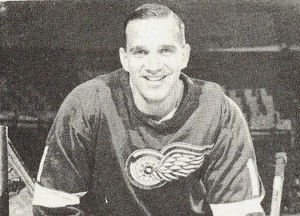
Those pundits, of course, were dead wrong. The youthful, slightly built Crozier proved to be more than capable at the NHL level. He came within one game of winning the Vezina Trophy, and did capture the Calder as the NHL rookie-of-the-year while leading his team to the top of the NHL standings. Very few Red Wing fans were left pining for the departed Sawchuk.
Veteran forwards led the way
While the youngster Crozier provided the stability in goal for the Red Wings, the group of veterans upon whom Abel leaned to heavily provided the leadership, scoring and defence necessary for a first-place finish.
Norm Ullman, blossoming into the best centre in the league, led the way. Ullman topped the NHL in goals with 42 and added 41 assists for 83 points. That was good enough for second place in the NHL scoring race. Aside from his scoring exploits, Ullman was the finest two-way centre in the game and the best forechecker as well. At this point in his career, Ullman is the most complete player in hockey.
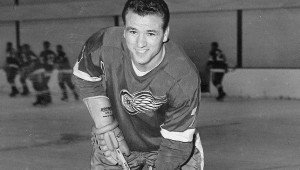
The incomparable Gordie Howe at 36 showed that he is a long way from having to hang up his skates. He scored 29 goals, third-best total in the league, 47 assists, second in the league, to finish third in overall league scoring.
Captain Alex Delvecchio, 32, also had a banner season with 25 goals and 42 assists.
Ted Lindsay, making a successful comeback after four years in retirement, provided leadership, toughness and veteran savvy, and was such a great example to the young players on the Wings. Sitting out only one game, Lindsay potted 14 goals and added a like number of assists. Once “Terrible Ted” was back in shape, no one could claim he was out of place in today’s NHL.
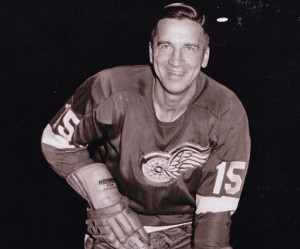
Other vets who contributed significantly up front were Parker MacDonald, 33, Floyd Smith, 29, and Ron Murphy, 31.
The Wings also have some fine youngsters on the rise, giving one the impression this team has a good chance of being very good for a long time. These include 23-year-old Bruce MacGregor, Paul Henderson, 21, and Pit Martin, 20.
Gadsby, Pronovost key on D
While the Wings were deep on the forward line, the defence was anchored by two greybeards who were among the best in the league. Bill Gadsby, now 37 and in his 19th NHL season, and Marcel Pronovost, 34, provided defensive stability and leadership. Their solid work kept Crozier from being overwhelmed or overmatched in his rookie season.
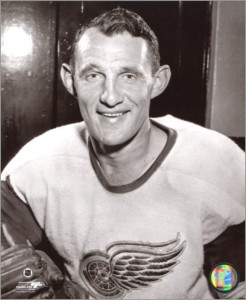
Gadsby was your prototypical stay-at-home defender. He didn’t score a goal this year, but was one of the best in the league at preventing them. Although the statistic is not tracked by the league, he was by far the runaway leader in blocking shots in the NHL.
Pronovost continues to be one of the best at making that first pass to start a rush out of the defensive zone. But, like Gadsby, working in front of a rookie goaltender saw him to concentrate on the defensive side of the game, and one couldn’t argue with the results.
Doug Barkley, at 27 considered a “young vet”, was the go-to guy for Abel in all situations. He anchored the power play and provided what little offence the Wings defence could muster with five goals and 27 assists. He was a rock on the blue line and is beginning to show some leadership ability as well.
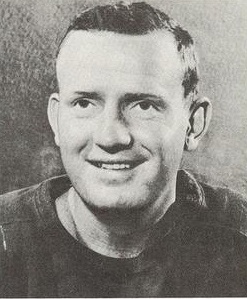
The other two Wing defencemen, Al Langlois and rookie Gary Bergman, had their moments and certainly couldn’t be considered liabilities.
Langlois was picked up from the New York Rangers late in the 63-64 season in a trade for Ron Ingram. He was inconsistent and prone to mistakes, but he was able to play a lot of minutes. He appeared to wear down as the season progressed, and was not particularly effective against Chicago in the semi-finals.
The rookie Bergman was claimed from Montreal in that same 1964 summer draft that saw Sawchuk depart. He proved to be a better player than advertised. Once he gained confidence and realized he could play well at the NHL level, he showed considerable promise. He also sagged in the playoffs, but he was slowed by injuries.
Playoff failure
As successful as the regular season was, the Detroit playoff exit in the semi-final was a huge disappointment. The Wings were eliminated by the Chicago Black Hawks in seven games in a series that was dominated by the home team until the final game, when the visiting Black Hawks won on Detroit ice.
It appeared in this corner that the Red Wings simply had shot their bolt in the quest for first place and had little left for the intensity that is the Stanley Cup playoff. The veteran-laden Wings just seemed to slow down as the series wore on and the youngsters on the club just weren’t able to cope with the bright lights that illuminate the Stanley Cup playoff stage.
Youngsters to watch
The Wings have some good young kids on the way. Martin, Henderson and especially MacGregor all played roles this season, showing good potential.
Martin, the former captain of the Hamilton Red Wings scored nine goals while Henderson counted eight times. They were often lined up with Lindsay and the veteran showed them the ropes of NHL life.
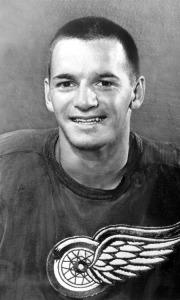
MacGregor hit the 20 goal mark for the first time in his career and showed defensive ability not usually evident in young players.
In junior, the Hamilton club in the OHA had a terrible season but boasted several players who have much NHL potential. Jimmy Skinner, son of the Red Wing executive, captained the team and scored over 100 points for a last-place club. Left-winger Real Lemieux scored 48 goals in 48 games and still has a year of junior hockey left. He also showed a mean streak and plays the game with an edge.
Seventeen-year-old Peter Mahovlich, younger brother of Toronto’s Frank, scored 20 goals. He is a big kid, and right now appears to be a boy growing into a man’s body. With three years of junior experience ahead of him, he could develop into a force in the NHL.
Nick Libett is a workmanlike winger who should be able to find an NHL role as well
Detroit’s Edmonton Oil Kings made the Memorial Cup final before running into the buzz-saw that was the Niagara Falls Flyers. Their captain, Bob Falkenberg, and goalie Gary Simmons were two youngsters who showed ability and character worthy of an NHL look at some point.
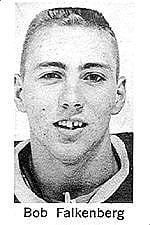
The Wings’ CPHL affiliate, the Memphis Wings, had a losing season under former Hamilton coach Eddie Bush. To be fair to Bush, the roster wasn’t a strong one, but there were some bright lights.
Goalie George Gardner, drafted from Boston last summer in the move that resulted in Sawchuk’s departure, played well under trying circumstances. Norm Beaudin, 22, scored 40 goals, but needs to learn the defensive side of the game, as well as improving his skating. Bryan Campbell, 20, looked like a good playmaking centre in his first professional season and should move up to at least the AHL next year.
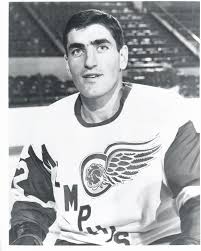
The Pittsburgh Hornets of the AHL also had a losing season under former NHL winger and now playing-coach Vic Stasiuk. The Hornets were a veteran club, but two youngsters that have earned NHL shots are Bobby Dillabough and Lowell MacDonald. Both are 23 and graduates of the Hamilton Red Wings. Twenty-two-year-old Butch Paul, a westerner, is another youngster Abel is high on. He missed much of the season with injuries.
What’s next?
So now that the Red Wings have achieved all they can in regular season, Abel is turning his sights on the ultimate goal – winning the Stanley Cup. The Detroit general manager has never been afraid of making a trade and it says here that he’ll be active that way this off-season.
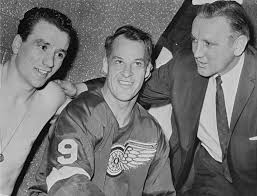
It’s not likely that he will break up his veteran core, but with some good kids on the way, Abel has lots of talent available for barter. It’s not easy to gauge whom Abel might deal away, because Sid rarely speaks ill of his players, but it’s clear that by playoff usage, guys like Langlois could find themselves on the way out.
Abel also has his eye on possibly re-acquiring Sawchuk. He knows that Punch Imlach in Toronto will have to drop one of Johnny Bower or (most likely) Sawchuk in order to keep the AHL’s best goalie, young Gerry Cheevers. If either of the two veteran Toronto backstops are left unprotected, Abel will grab one of them to lessen Crozier’s load and further mentor the youngster.
The Red Wings appear to be set up for at least short-term success. If the prized youngsters come along as planned, a long, successful run for the Wings is entirely possible.